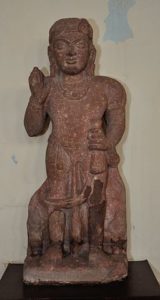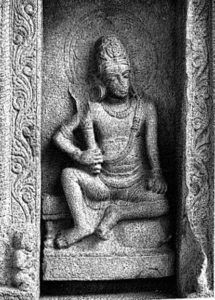Jottings: On Kubera, wealth and character
I’ve been neglecting enfolding of late, as I’ve been absorbed in other writing projects that have diverted my attention (more of which, another time). It struck me recently though, that one way of getting back into a regular posting regime would be to try and write about some of the material I’ve been reading of late.
Most recently, I’ve been doing some research on Kubera, the Hindu god of wealth. Google Kubera and you’ll see that he is indeed a popular Indian deity when it comes to petitioning the gods for matters of finance and money and there is an abundance of websites detailing Kubera’s mantras, yantras, and puja: even online pujaris willing to do Kubera Puja for you for a reasonable fee.
You might expect then, for a god of wealth, there would be a corpus of material dealing with Kubera’s character and highlighting Kubera’s generosity and willingness to part with his treasures for the needy and the worthy. But no, it’s not that simple. Indeed, one might say that he has something of a reputation for being miserly. Some of the stories in which Kubera makes an appearance seem to me to indicate a tension in the relationship between wealth and the other major life-goals (Kama, Dharma, Moksha). Here are two sources which I think illustrate the complexity of Kubera and these tensions.
 The first story is from the Brahma Purana and can be found in full in John Grimes’ lovely book Ganapati: Song of the Self (State University of New York, 2995). Briefly, the tale begins with Kubera visiting mount Kailasa, the abode of Śiva and Pārvatī and inviting them to a lavish dinner (in order to show off his wealth). Śiva and Pārvatī are otherwise engaged on this occasion, and tell Kubera that he can feed the child Gaṇeśa instead. Śiva warns Kubera that Gaṇeśa has a healthy appetite, but Kubera is confident … and as we shall find out, rather too confident that he can feed Gaṇeśa to his heart’s content.
The first story is from the Brahma Purana and can be found in full in John Grimes’ lovely book Ganapati: Song of the Self (State University of New York, 2995). Briefly, the tale begins with Kubera visiting mount Kailasa, the abode of Śiva and Pārvatī and inviting them to a lavish dinner (in order to show off his wealth). Śiva and Pārvatī are otherwise engaged on this occasion, and tell Kubera that he can feed the child Gaṇeśa instead. Śiva warns Kubera that Gaṇeśa has a healthy appetite, but Kubera is confident … and as we shall find out, rather too confident that he can feed Gaṇeśa to his heart’s content.
Gaṇeśa follows Kubera back to his own celestial domain and Kubera rolls out the grub. Gaṇeśa eats and eats, and the more he eats, the more hungry he becomes. Kubera’s servants cannot keep the food flowing fast enough; and Gaṇeśa eats the table, the serving vessels, Kubera’s palace, the trees and indeed, the entirety of the kingdom. Finally, Gaṇeśa threatens to eat Kubera himself! Kubera rushes off to plead with Śiva to save him from being swallowed by Gaṇeśa, and Śiva gives Kubera a handful of puffed rice, which he says, will appease Gaṇeśa’s hunger. Kubera returns to Gaṇeśa, and humbly offers him the rice, whereupon Gaṇeśa was instantly satisfied.
Now the moral here, according to John Grimes, is that selfless devotion and humility count for more, in the long run, that mere wealth on its own, and the tale also clearly illustrates the perils of pride. Kubera here seems to be prideful, boastful, and something of a figure of fun.
 The second story, which comes from a satire by the 11th century Kashmiri poet Kṣemendra, who studied rhetoric under famous tantric polymath Abhinavagupta. Kṣemendra is famous for his biting social commentary, humour, and his tendency to be somewhat vulgar at times.
The second story, which comes from a satire by the 11th century Kashmiri poet Kṣemendra, who studied rhetoric under famous tantric polymath Abhinavagupta. Kṣemendra is famous for his biting social commentary, humour, and his tendency to be somewhat vulgar at times.
The full text of the story can be found in Somadeva Vasudeva’s Three Satires: Nīlakaṇṭha, Kṣemendra & Bhallaṭa (Clay Sanskrit Library, 2005) which features an English translation of Kṣemendra’s Kalāvilāsa – “The Grace of Guile” or A.N.D Haksar’s Three Satires from Ancient Kashmir (Penguin Classics, 2011). It should be noted that a much earlier version of this tale appears in the Mahābhārata.
This tale concerns Shukra, a great Yogi and the preceptor of the daityas who, finding himself impoverished, goes to visit Kubera and begs him, on the basis of their long friendship, to help him out. Kubera, after some consideration, whilst acknowledging the friendship and affection he has for Shukra, replies that he cannot give up even a small sum of money. Shukra is perhaps understandably annoyed by this rejection. After pondering the matter with his aides, enters the ‘heart of Kubera’ by means of his yogic power of possession 1, and causes Kubera to become ‘extraordinarily generous’ so that he gives all his wealth to some Brahmins.
Kubera, after Shukra has left his body, realizes what has happened and laments to his allies:
“I have been duped by a thoroughly avaricious sorcerer masquerading as a friend. The evil Shukra knows my weaknesses, and he is unassailable since he has the support of the daityas.
Now, bereft of wealth, I have all of a sudden become as insignificant as a piece of straw. To whom can I confide my grief? What can I do? Where can I go?”
(Vasudeva, 2005, p147)
Kubera appeals to Śiva, and Śiva sends an envoy to Shukra, summoning him to appear before him and account for himself. Not surprisingly, Shukra is unrepentant of his deed and tries to argue with Śiva – never a good idea. Śiva, tiring of Shukra’s attempts to justify his actions, swallows Shukra. Despite suffering the agonies of the fire of Śiva’s belly, Shukra declares that he would rather die than give up the money. Just as he is about to expire, Shukra prays to Gauri, who affectionately appeases Śiva so that Shukra is ejected from Śiva’s body in the form of his semen.
Kṣemendra closes with the following observations:
“So, those avaricious by nature endure even savage torture without giving up money, just as lowborn wretches cannot give up their inbred dishonesty.
Therefore, the art of fraud, born from avarice, a delusion which moves crookedly, dwells in the hearts of the greedy. A man who is not greedy does not cheat.”
(Vasudeva, 2005, p157, 159)
It is easy to see here that Shukra is at fault for obtaining wealth through deception. Śiva berates Shukra for doing so:
“To whom is wealth not dear? Who is not fascinated by
wealth? But those who long for the wealth of a good reputation
do not aspire to gain riches by illicit means. Do not! Do
not besmirch the entire, unsullied lineage of Bhrigu with
the stain of avarice! For the cloud of avarice is the enemy of
the swans of untainted repute.”
(Vasudeva, 2005, p151)
But, I think, Kubera is not entirely blameless in the matter either. In his speech to Shukra, he shows himself to be equally bound up with wealth and avarice:
““I remember you as my boyhood companion with affection beyond all measure. But I cannot afford to give up
even a minuscule sum of money, the essence of life.A kinsman is someone who demands affection,
friends can be made by all kinds of favors,
wives and sons are easy to come by,—
it is wealth alone
that is difficult to win in this world.Giving away money is extremely rash,
is beset with difficulties,
is a most startling feat.
Even someone who is ready to give up his own body
could not give up even a paltry amount of money.”
(Vasudeva, 2005, p145)
It does seem then, that Kubera’s association with wealth is not without complications. Whilst he is honored, as Treasurer to the gods, it seems that like any administrator, he is sometimes portrayed as hanging onto his treasures, with all the attendent ethical and moral complications of doing so.
Notes:
- see Chapter 4 of David Gordon White’s Sinister Yogis (University of Chicago Press, 2005) for some further discussion ↩
